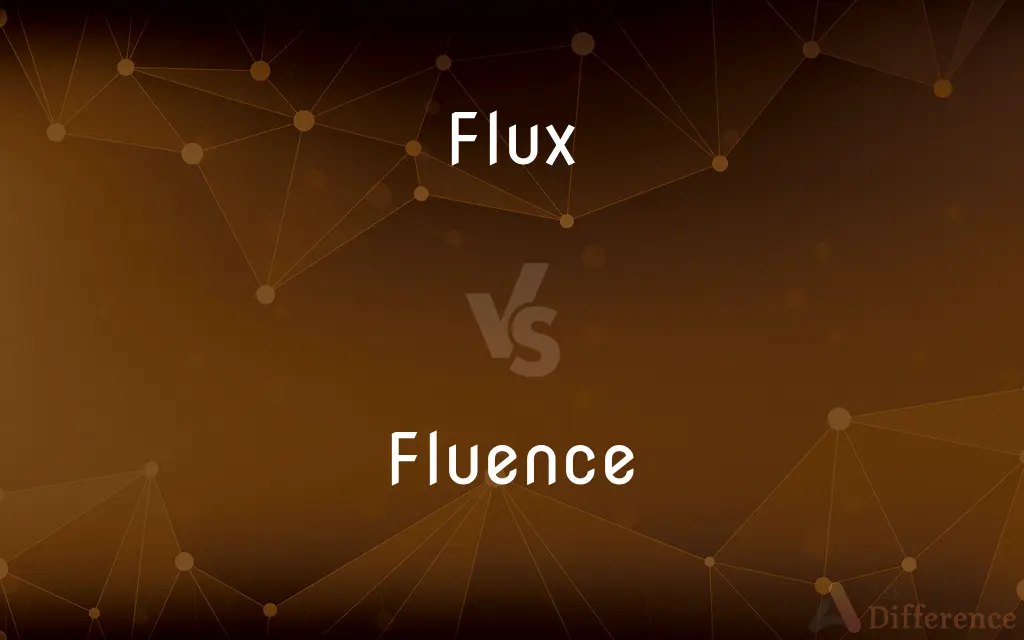Flux vs. Fluence — What's the Difference?
Edited by Tayyaba Rehman — By Maham Liaqat — Updated on May 1, 2024
Flux measures the rate of flow per unit area, like in radiation or fluid dynamics, whereas fluence counts the total quantity of energy, particles, or radiation passing through a surface.

Difference Between Flux and Fluence
Table of Contents
ADVERTISEMENT
Key Differences
Flux describes the rate at which something such as energy, particles, or fluid passes through a unit area, highlighting dynamics over time. Whereas fluence is used to quantify the total amount of something like radiation or particles that crosses a surface, emphasizing cumulative exposure.
In physics, flux is often used to understand how a field, like magnetic or electric, interacts with a specific area, providing a rate of transfer. On the other hand, fluence is more about the total impact over an area, crucial for dosimetry in radiation fields where total exposure is critical.
Flux calculations are integral in scenarios where flow needs to be measured continuously, such as in heat transfer or fluid mechanics. Whereas fluence is significant in applications where the total dosage or exposure must be calculated, like in material irradiation or photobiology.
The concept of flux is dynamic, focusing on the process and intensity of the flow at any moment. In contrast, fluence is static, concentrating on the accumulation over time without regard to the rate at which the exposure occurs.
Understanding flux helps in designing systems that need efficient flow management, like air conditioning or water filtration systems. While understanding fluence is essential for assessing long-term effects in fields such as astronomy or environmental science where exposure levels are studied over extended periods.
ADVERTISEMENT
Comparison Chart
Definition
Rate of flow per unit area
Total quantity of energy, particles, or radiation passing through a surface
Key Usage
Measuring dynamics of flow, e.g., in fluid dynamics
Calculating total exposure, e.g., in radiation dosimetry
Measurement
Per unit area per unit time
Total amount over entire exposure time
Focus
Dynamic, instantaneous rates
Cumulative, total accumulation
Application Example
Calculating air flow in HVAC systems
Measuring total solar radiation received on a panel
Compare with Definitions
Flux
Flux refers to the quantity of energy that flows through a unit area per unit time.
The solar flux measures how much solar energy hits one square meter every second.
Fluence
Fluence measures the total energy delivered per unit area, used in radiation therapy.
The fluence of radiation determines the dose received by a tumor.
Flux
In electromagnetism, flux denotes the electric or magnetic field passing through a surface.
Magnetic flux through a loop determines the induced electromotive force.
Fluence
In environmental science, fluence refers to the amount of sunlight received in a given area over a specific period.
Plant growth can be affected by the fluence of sunlight during the growing season.
Flux
In computing, data flux refers to the rate of data transfer through a network.
The network experienced high data flux during the system update.
Fluence
Fluence in particle physics measures the number of particles per unit area passing through a surface.
Neutron fluence calculations are critical in nuclear reactor safety.
Flux
Flux in biology could describe the rate of transfer of molecules across a membrane.
Oxygen flux in the lungs relates to how quickly oxygen passes into the bloodstream.
Fluence
Optical fluence refers to the total amount of light energy delivered to a surface.
Laser treatments for skin utilize specific fluence levels for effectiveness.
Flux
In chemistry, flux is used to promote or prevent oxidation during metal joining processes.
Flux in soldering helps prevent the metal from oxidizing as it heats.
Fluence
In materials science, fluence is used to describe the total exposure to damaging particles, like in radiation damage studies.
The fluence of ions in the material was measured to assess radiation damage.
Flux
Flux describes any effect that appears to pass or travel (whether it actually moves or not) through a surface or substance. A flux is a concept in applied mathematics and vector calculus which has many applications to physics.
Fluence
(obsolete) Fluency
Flux
The action or process of flowing or flowing out
The flux of ions across the membrane
Fluence
(physics) A measure of particle flux (or that of a pulse of electromagnetic radiation)
Flux
Continuous change
Since the fall of the wall Berlin has been a city in flux
The whole political system is in a state of flux
Fluence
A magical or mysterious force; hypnotic power; energy.
Flux
A substance mixed with a solid to lower its melting point, used especially in soldering and brazing metals or to promote vitrification in glass or ceramics.
Fluence
Fluency.
Flux
Treat (a metal object) with a flux to promote melting.
Flux
A flow or flowing of a liquid.
Flux
The flowing in of the tide.
Flux
A continuing movement, especially in large numbers of things
A flux of sensation.
Flux
Constant or frequent change; fluctuation
"The constant flux of people and groups ensures that human gene pools will always be mixed" (Steve Olson).
Flux
(Medicine) The discharge of large quantities of fluid material from the body, especially the discharge of watery feces from the intestines.
Flux
The rate of flow of fluid, particles, or energy through a given surface.
Flux
See flux density.
Flux
The lines of force of an electric or magnetic field.
Flux
A substance applied to a surface to be joined by welding, soldering, or brazing to facilitate the flowing of solder and prevent formation of oxides.
Flux
A mineral added to the metals in a furnace to promote fusing or to prevent the formation of oxides.
Flux
An additive that improves the flow of plastics during fabrication.
Flux
A readily fusible glass or enamel used as a base in ceramic work.
Flux
To melt; fuse.
Flux
To apply a flux to.
Flux
To become fluid.
Flux
To flow; stream.
Flux
The act of flowing; a continuous moving on or passing by, as of a flowing stream.
Flux
A state of ongoing change.
The schedule is in flux at the moment.
Languages, like our bodies, are in a continual flux.
Flux
A chemical agent for cleaning metal prior to soldering or welding.
It is important to use flux when soldering or oxides on the metal will prevent a good bond.
Flux
(physics) The rate of transfer of energy (or another physical quantity), especially an electric or magnetic field, through a given surface.
That high a neutron flux would be lethal in seconds.
Flux
(archaic) A disease which causes diarrhea, especially dysentery.
Flux
(archaic) Diarrhea or other fluid discharge from the body.
Flux
The state of being liquid through heat; fusion.
Flux
(transitive) To use flux on.
You have to flux the joint before soldering.
Flux
(transitive) To melt.
Flux
(intransitive) To flow as a liquid.
Flux
(uncommon) Flowing; unstable; inconstant; variable.
Flux
The act of flowing; a continuous moving on or passing by, as of a flowing stream; constant succession; change.
By the perpetual flux of the liquids, a great part of them is thrown out of the body.
Her image has escaped the flux of things,And that same infant beauty that she woreIs fixed upon her now forevermore.
Languages, like our bodies, are in a continual flux.
Flux
The setting in of the tide toward the shore, - the ebb being called the reflux.
Flux
The state of being liquid through heat; fusion.
Flux
Any substance or mixture used to promote the fusion of metals or minerals, as alkalies, borax, lime, fluorite.
Flux
The quantity of a fluid that crosses a unit area of a given surface in a unit of time.
Flux
Flowing; unstable; inconstant; variable.
The flux nature of all things here.
Flux
To affect, or bring to a certain state, by flux.
He might fashionably and genteelly . . . have been dueled orfluxed into another world.
Flux
To cause to become fluid; to fuse.
Flux
To cause a discharge from; to purge.
Flux
The rate of flow of energy or particles across a given surface
Flux
A flow or discharge
Flux
A substance added to molten metals to bond with impurities that can then be readily removed
Flux
Excessive discharge of liquid from a cavity or organ (as in watery diarrhea)
Flux
A state of uncertainty about what should be done (usually following some important event) preceding the establishment of a new direction of action;
The flux following the death of the emperor
Flux
The lines of force surrounding a permanent magnet or a moving charged particle
Flux
(physics) the number of flux changes per unit area
Flux
In constant change;
His opinions are in flux
The newness and flux of the computer industry
Flux
Move or progress freely as if in a stream;
The crowd flowed out of the stadium
Flux
Become liquid or fluid when heated;
The frozen fat liquefied
Flux
Mix together different elements;
The colors blend well
Common Curiosities
What units are used to measure flux and fluence?
Flux is often measured in units like watts per square meter (W/m²) or particles per square meter per second, while fluence is measured in joules per square meter (J/m²) or particles per square meter.
How do you measure flux in practical applications?
Flux is typically measured using instruments like flow meters in fluids or radiometers for radiation, depending on the type of flux being considered.
Can the concept of flux be applied to non-physical flows, like information?
Yes, in information theory, flux can refer to the rate of data transfer across a network, affecting bandwidth and network design.
What is the significance of measuring fluence in solar energy applications?
Measuring fluence in solar energy applications helps in assessing the potential energy yield and efficiency of solar panels over time.
What challenges arise in measuring fluence accurately?
Accurate fluence measurement can be challenging due to factors like varying intensities over time and the need for precise integration of flux data.
Is fluence a cumulative measurement?
Yes, fluence is a cumulative measure of the total exposure over a period, regardless of the intensity at any given time.
In which fields is fluence particularly important?
Fluence is especially important in fields like photobiology, radiation therapy, and materials science where total exposure affects outcomes.
How does flux affect system design in electronics?
In electronics, thermal flux affects design considerations for heat dissipation, ensuring devices operate within safe temperature limits.
How does fluence relate to the concept of dose in radiation exposure?
Fluence is directly related to dose, as the dose is calculated based on the fluence of radiation energy absorbed by a material or tissue.
How do professionals ensure accurate flux measurements in complex systems?
Accurate flux measurements in complex systems are ensured through calibration of measuring devices, regular maintenance, and the use of advanced computational models to interpret data.
Why is it important to distinguish between flux and fluence in environmental studies?
Distinguishing between flux and fluence helps in understanding both the immediate rates of environmental processes and their cumulative impacts over time.
Can flux be negative, and if so, what does that indicate?
Flux can be negative, which typically indicates a reversal in the direction of flow, such as in heat transfer or electrical fields.
How does the concept of flux aid in water management?
Flux measurements are vital in water management for assessing the rate of water flow, which is crucial for flood prediction and irrigation systems.
What tools are used to measure fluence in the field of optics?
In optics, instruments like power meters combined with time measurements are used to calculate fluence for laser and light therapies.
What role does fluence play in understanding climate change?
Fluence measurements of solar radiation are crucial for climate modeling and understanding changes in Earth’s energy balance.
Share Your Discovery

Previous Comparison
Allegory vs. Allusion
Next Comparison
Pager vs. BeeperAuthor Spotlight
Written by
Maham LiaqatEdited by
Tayyaba RehmanTayyaba Rehman is a distinguished writer, currently serving as a primary contributor to askdifference.com. As a researcher in semantics and etymology, Tayyaba's passion for the complexity of languages and their distinctions has found a perfect home on the platform. Tayyaba delves into the intricacies of language, distinguishing between commonly confused words and phrases, thereby providing clarity for readers worldwide.
















































